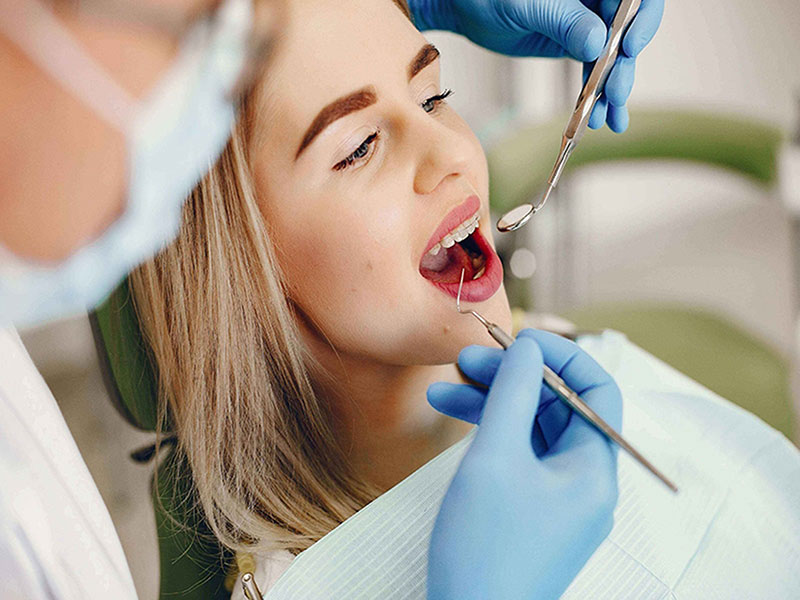Dental Prosthetics
Dental prosthetics—such as dentures—are removable replacements for lost teeth and surrounding tissues. There are two types of dentures available: full dentures and partial dentures. Full dentures are used when all teeth are lost, while partial dentures are used when some natural teeth remain.Complete Dentures
Complete dentures can be “regular” or “immediate.” Regular dentures are used about eight to twelve weeks after tooth extraction. After the teeth are removed and the gum tissue begins to heal, a regular denture is ready to be placed in the mouth. Unlike regular dentures, immediate dentures are pre-made and can be placed immediately after tooth extraction. As a result, the person doesn’t have to go without teeth during the healing period. However, bones and gums shrink over time, especially during the healing phase after tooth removal. Therefore, one of the drawbacks of immediate dentures compared to regular dentures is that they require more adjustments to fit properly during the healing process and are generally considered a temporary solution until regular dentures can be used.Partial Dentures
Partial dentures, or bridges, typically consist of replacement teeth attached to a pink plastic base or gum-colored material, sometimes reinforced with a metal framework to help keep the prosthesis in place.Is There an Alternative to Dentures?
Yes, dental implants can also be used instead of dentures. The cost of implants is generally higher, but implants offer a feel similar to natural teeth. Dental implants replace dentures but are not suitable for everyone. Dental implants can also support dentures, providing more stability for the prosthetics.For consultation about implants, talk to your dentist.How Are Dentures Made?
The process of making dentures takes several weeks and involves multiple appointments. Once the dentist or prosthodontist (a dentist specialized in restoring and replacing teeth) determines which type of prosthesis is best for you, the general steps are as follows:- Taking impressions of the jaw and measuring the distance between the jaws and how the mouth closes
- Creating models, wax forms, and/or plastic patterns in the exact shapes and positions needed
- Testing these models and reviewing the prosthesis for color, shape, and fit
- Molding the final prosthesis
- Making final adjustments as needed
What Do New Dentures Feel Like?
New dentures may feel odd or loose for a few weeks as the cheek muscles and tongue learn to hold them in place, and as you become more comfortable inserting and removing them. It’s also common to experience some minor irritation or increased saliva flow when first using dentures, but these issues typically subside as the denture adjusts and you get used to it.Do Dentures Change My Appearance?
Dentures are designed to resemble your natural teeth, so they typically create only a slight change in your appearance. In fact, dentures may even enhance your smile and fill out your facial appearance.Dental services
With a special discount
Possibility of Interest-Free Installment Payments
Providing all specialized dental services, including implants, orthodontics, cosmetic dentistry, surgery, and specialized treatments for children at Dr. Damghanipour’s specialized dental clinic.

Is Eating with New Dentures Difficult?
Eating with new dentures requires some practice and may be uncomfortable for some users for the first few weeks. To get accustomed to your new dentures, start with soft foods cut into small pieces. Gently chew with both sides of your mouth. Once you’ve become used to the new dentures, you can add other foods and return to your regular diet. Be cautious with hot or hard foods, bones, and foods with sharp edges. Avoid very sticky or hard foods. Do not chew gum while wearing dentures. Also, do not use toothpicks while wearing dentures.Care for Dentures
Proper care of dentures is important for both the health of the prosthesis and your oral health. Here are some tips:- Handle dentures with care. To prevent them from falling, place them on a folded towel or in a sink full of water when handling them.
- Brush dentures daily, but do not use regular toothpaste. Toothpaste is abrasive and can create microscopic scratches where food particles and plaque can accumulate. Like natural teeth, dentures should be brushed daily to remove food and plaque. Brushing also helps prevent permanent staining. Use a soft-bristled brush specifically designed for cleaning dentures. Avoid using hard-bristled brushes as they may damage or break the dentures. Gently brush all surfaces of the denture, being careful not to damage it. Rinse dentures after each meal.
- Clean dentures with a denture cleaner. You can use mild hand soap or dishwashing liquid to clean your dentures. Household cleaners and many toothpastes may be abrasive to dentures. Avoid using bleach, as it may whiten the pink part of the prosthesis. You can also use an ultrasonic cleaner. This small device, resembling a tank, contains a cleaning solution, and the sound waves create a motion that removes deposits. However, the ultrasonic cleaner does not replace daily brushing. Products bearing the American Dental Association (ADA) seal of approval are recommended as they have been evaluated for safety and effectiveness.
- When not using dentures, store them properly. Dentures must stay moist to avoid drying out and losing their shape. When not in use, keep dentures in a denture soaking solution or water. However, if the dentures have metal attachments, the metal may become damaged in soaking solutions. Your dentist can recommend the best care practices for your dentures. Never place dentures in hot water as it may cause them to warp.
